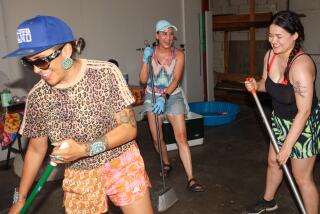CAL STATE NORTHRIDGE : Powwow Brings Traditions Alive
- Share via
When Jason Kordek goes out dancing, he’s better suited to dance with wolves than to music by the New Kids on the Block.
Dressed in traditional American Indian regalia of buckskin, beaded moccasins and a breastplate with real bones, the 13-year-old Anaheim boy appeared at a Cal State Northridge powwow last week to celebrate his Indian heritage.
“I came to a powwow one day and got real interested in it,” said Kordek, whose ancestry ties him to the Lakota Indians featured in the film “Dances With Wolves.” He began dancing in the Lakota manner, he said, “to keep the tradition going.”
The annual powwow, held Sunday by CSUN’s American Indian Student Assn., was designed to continue many American Indian traditions, organizers said.
“The powwow is the festival of springtime,” said Peter Aguirre, 21, the association’s president.
Tribes such as the Cheyenne, Sioux, Navajo, Hopi and others were represented at the event, which attracted several hundred people.
The daylong event allowed both Indians and non-Indians to experience Navajo fry bread, intertribal ceremonial dancing and other traditions, as well as to walk into an authentic Sioux tepee that had been raised on the grass.
But most who attended were American Indians. For many, the event provided a way to maintain their heritage in the middle of an urban jungle.
“L.A. has the largest urban Indian concentration in the United States,” said Daniel Tom, 39, a Paiute-Pomo Indian who works at Rocketdyne.
Tom said many of the 100,000 Indians estimated to live in Los Angeles were relocated from reservations or moved here because of economic reasons. The result, he said, can be widespread feelings of displacement.
Aguirre said: “We’re used to a tightknit society. Having powwows, it helps.”
The need for support for American Indians extends beyond the powwow to the campus, he said. “The university is not really geared for obtaining Native Americans and retaining them.”
Aguirre said many of the 151 American Indian students at CSUN will drop out for financial or other reasons. He said he hopes someday to help change that.
Meanwhile, he said he and other American Indians will derive strength from the message of people like Phyllis Big Left Hand, a Cheyenne-Sioux who spoke at the powwow. “We came here today to share, to stay together, to stay on Mother Earth. Children, stand tall and be proud,” she said.
More to Read
Sign up for Essential California
The most important California stories and recommendations in your inbox every morning.
You may occasionally receive promotional content from the Los Angeles Times.













